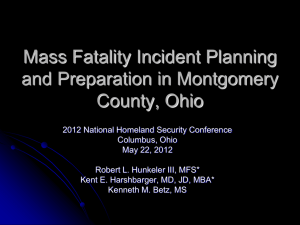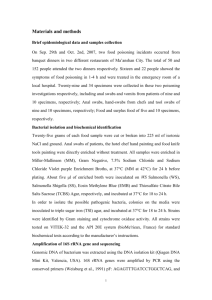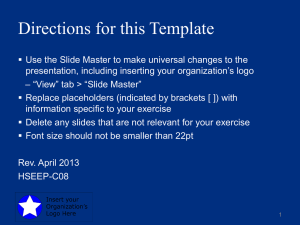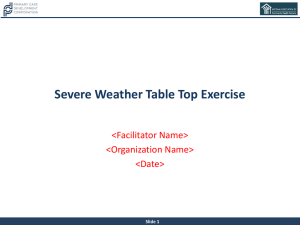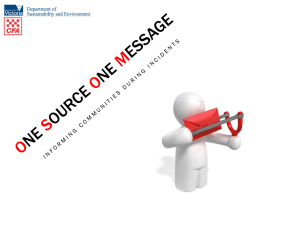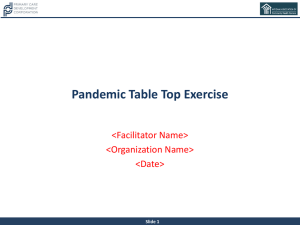Tabletop Exercise (TTX)
advertisement
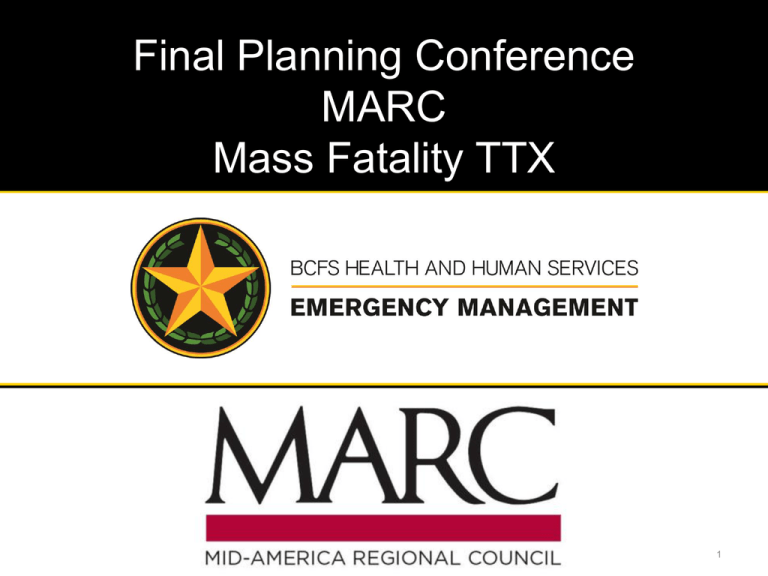
Final Planning Conference MARC Mass Fatality TTX 1 Planning Team • • • • • • • • Mike Henderson, Jackson County ME Melanie Fields, Kansas City, MO Crime Lab Ryan Rezzelle, Johnson County Crime Lab Justin Sorg, MARC Dan Manley, MARC Steve Adukaitis, MARC Additional Members Present BCFS Introductions 2 SCENARIO CONFIDENTIALITY • The exercise scenario may pose politically sensitive issues and may portray detailed response plans and potential response shortcomings. Planners and participants must treat exercise-related information as sensitive. Information related to the exercise may not be reproduced or released without the express consent of Kansas City Region Mortuary Operational response group or the Mid-America Regional Council (MARC). 3 Today’s Agenda • • • • • • • • • Welcome and Introductions Review of Initial Planning Conference Issues Objectives Review Exercise Document Review Exercise Logistics Exercise Evaluation Exercise Participants Review and Action Items Questions 4 Operational Security • This briefing contains exercise and operational material that must be safeguarded. • The materials in this briefing are categorized as “for official use only” 5 Exercise Goal • To provide participants with an opportunity to learn about and subsequently exercise the current concepts, plans, capabilities and considerations for responding to a Mass Fatality Incident within the Kansas City Regional Response System. 6 Scope • This exercise will focus on the roles of the Kansas City Regional Mortuary Operational Response Group (KCRMORG), Police, Fire, EMS, Emergency Management, Public Health Emergency Preparedness and Response Branch, jurisdictional Medical Examiner and Coroners, both public and private medical/health providers, and mortuary care personnel in response to the consequences of a mass fatality event. Processes and decision-making are more important than minute details. The emphasis is on coordination, integration of capabilities, problem identification, and resolution. 7 Today’s Purpose • To collectively determine the parameters (objectives, scenario, scheduling and documents) for the conduct of the MARC Table Top Exercise (TTX) 8 Tabletop Exercise (TTX) Overview • Tabletop Exercise (TTX). A tabletop exercise involves key personnel discussing simulated scenarios in an informal setting. TTXs can be used to assess plans, policies, and procedures. • No-inspection, no-fault, learning environment • Based on design objectives 9 Tabletop Exercise (TTX) Meetings • One Concepts and Objectives Meeting. Occurred 3/28 • Two planning conferences (Initial, Final): – Initial: identification of trusted agents, exercise facilities and equipment, and logistics; development of exercise parameters (scenario, location, targets, objectives, exercise concept, participants) Today 4/25 – Final: finalize Sitman, exercise documents, injects, and coordinate exercise support. 5/6 – (5/10) • One day TTX exercise with 4 hours of controlled exercise play followed by an After Action Review. 5/21 • After Action Conference. 5/30 10 Functional Response Groups • • • • • Unified Command Health and Medical Fatality Management Emergency Management/Logistics Public Information/ Victim Identification Center (VIC) 11 Exercise Objectives • Unified command/Incident command interface: Examine the interaction between various agencies involved in incident management. • Fatality Management Surge Capacity: Identify the requirements, resources and processes to support the full spectrum of fatality management activities during a significant incident or event resulting in mass fatalities. 12 Exercise Objectives • Coordination, communication and control among private entities and local agencies: Examine interactions between public and private sectors during the threat or actual occurrence of a natural or manmade incident or event. Examine the interface and understanding among local agencies in the conduct of incident management activities. Determine strengths and weaknesses in methods of communication between agencies. Test the information sharing function between the public safety and public health/medical functions. 13 Exercise Objectives • Resource management: Determine strengths and weaknesses in the local coordination and integration of response resources. Identify critical issues and potential solutions. • Public Information: Discuss options to provide timely information to the population and assist in minimizing KCRMORG. i.e., “Risk Communications.” Review plans to preclude dissemination of conflicting data. 14 Review Exercise Schedule 8:00 am 8:30 am 8:45 am Registration Welcome and Introduction Overview of Regional Mass Fatality Plan and KCRMORG Capabilities 9:15 am Module 1 – Initial Incident Situation Briefing Caucus Period Facilitated Discussion Module 2 – Reinforced Response 10:15 am Situation Update Caucus Period Facilitated Discussion 10:45 am Module 3 – Processing & Disposition of Human Remains Situation Update Caucus Period Facilitated Discussion 11:30 am Review and Conclusion 12:30 pm Closing Comments 15 Scenario • Severe weather forecast • EF-5 Tornado strikes community destroying buildings throughout the region • Follow on storm system approaching • Media issues • Large number of deaths 16 Scenario • Large number of deceased being left at hospital causing facility issues • Logistical concerns • Hazardous materials concerns • Utility service disruption • Political and religious inquiries • Family reunification inquiry 17 Possible Participants Additional discussion about participants and group assignments. 18 Controller/Evaluators • Introduce, maintain, and coordinate exercise events using the Sitman • Observe and report exercise artificialities that interfere with realism • Know the procedures for the element being evaluated • Understand the exercise concept and scenario • Cover each assigned organization/exercise area • Inform lead controller/evaluator of problems related to exercise design • Observe, record, and report player actions • Ensure collection of all evaluation data, evaluation forms, and materials after the exercise 19 Exercise Facilitation • Lead Facilitator • Facilitators • Facilitator/Controller/Evaluator Interaction 20 Exercise Documents • Situation Manual (Sitman) – Provides operational details and scenario information – All participants will receive exercise information in the following three distinct modules: Module 1 – Initial Incident Module 2 – Reinforced Response Module 3 – Processing & Disposition of Human Remains • Final Draft provided at the FPC • Distributed prior to exercise 21 Logistics and Administrative Support Requirements (Community Responsibilities) • Designate Suitable Exercise Locations (Final Planning Conference, TTX , AAR Conference) • TTX - Overland Park Fire Training Academy (Multipurpose Room) 12401 HEMLOCK STREET OVERLAND PARK, KS 66213 – – – – – • Caucus Rooms Materials (easels, markers, note pads, plans, Internet wireless) Projection Location ID, Parking Break Planning AAR Conference – MARC Mid-America Regional Council 600 Broadway, Suite 200 Kansas City, MO 64105 22 Evaluation Tools • Participant Feedback Sheets • Scribes • Controller/Evaluator Observations • EEG’s (Exercise Evaluation Guides) • Discussion-based-Operational-based – Communication, Critical Resources, Emergency Public Info-warming, EOC Management, Fatality Management, Intelligence and Info Sharing, On-site Incident Management, Risk Management • Hotwash 23 After Action Report • Limited distribution • • Recommendations Observations MARC Purpose • • • Provide feedback Modify Plans Baseline 24 Today’s Planning Decisions • • • • Participants/group assignments Objectives Scenario Facilitator/Controller/Evaluator Meeting: May 20 • TTX: May 21 • AAR Conference: May 30 25 Points of Contact • Justin Sorg Emergency Services Planner III Mid-America Regional Council 600 Broadway, Suite 200 Kansas City, MO 64105 www.marc.org (816) 701-8293 • Joe Lynch Project Manager BCFS Health & Human Services Emergency Management Division San Antonio, Texas, USA Joe.lynch@bcfs.net 205-936-3958 26 Questions, Comments, Issues Thank-you! 27 • • • • United Command Health and Medical Fatality Management Emergency Management/Logistics • Public Info/Victim Identification Center 28

